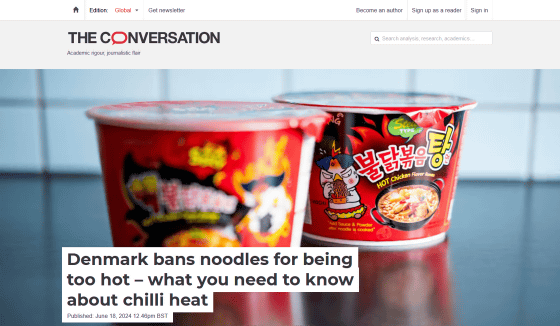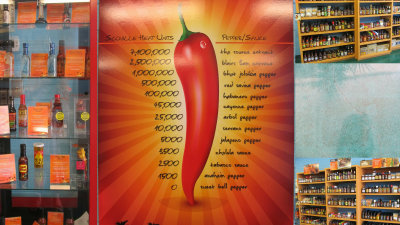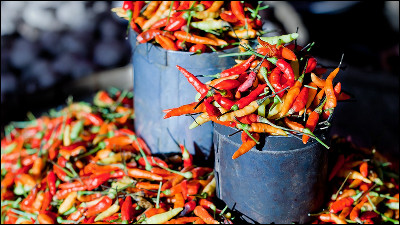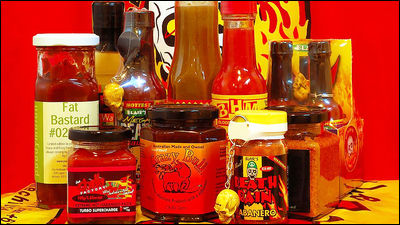Why does super spicy food attract people?

In June 2024, the Korean super-spicy instant ramen '
Denmark bans noodles for being too hot – what you need to know about chilli heat
https://theconversation.com/denmark-bans-noodles-for-being-too-hot-what-you-need-to-know-about-chilli-heat-232420

◆Why do we find chili peppers 'spicy'?
The reason we feel hot when we eat chili peppers is because of a chemical called capsaicin contained in chili peppers. When capsaicin binds to a protein called TRPV1 , which is found on the surface of sensory organs such as the digestive system (mainly the mouth), nose, and skin, it causes a hot sensation.
Normally, TRPV1 is involved in the ability to detect painfully high temperatures, but when capsaicin binds, TRPV1 is induced at lower temperatures, causing an inflammatory response similar to that of a burn, including swelling, sweating, and discomfort at the site. This response, triggered by capsaicin, has been instrumental in the study of thermoreceptors and led to the 2021 Nobel Prize in Physiology or Medicine .
It is believed that chili peppers evolved to produce capsaicin to protect themselves from being eaten by wild mammals. The only mammals that eat chili peppers, other than humans, are a small group of climbing trees (shrews) that have a mutation in the TRPV1 gene.
On the other hand, birds have a different mechanism for heat sensing, so they are not affected by capsaicin and can eat chili peppers without any problems. In fact, birds play an important role in expanding the range of chili peppers by eating chili peppers and spreading their seeds widely. In addition, Roach advised that by applying this mechanism, it is possible to mix chili powder into wild bird feed to prevent the feed from being eaten by mice.

How spicy are the chili peppers?
The unit of measurement for the spiciness of chili peppers,
A completely bland bell pepper has a Scoville rating of 0, the Tabasco pepper famous for its use in Tabasco sauce has a Scoville rating of up to 50,000, and the world's hottest chili pepper, Pepper X , has a Scoville rating of 2.7 million. Meanwhile, the Danish recalled Buldak stir-fried noodles have a Scoville rating of about 9,000, according to multiple online sources.

The pleasures and dangers of spicy food
Eating extremely spicy food is an intense experience, and some people enjoy the sensation of spiciness, even the 'high' it gives them by releasing the neurotransmitter endorphins .
But of course, heat can cause a similar reaction to a burn, making some people choke, cry, or feel pain after eating a chili pepper. In the video below, you can see the reaction of someone who took a bite of a Carolina Reaper , previously known as the hottest chili pepper in the world.
Eating a Carolina Reaper (HOT PEPPER) on live TV!!! - YouTube
Also, eating too much chili peppers can lead to excessive sweating, nausea, and gastrointestinal disorders, but there is little evidence of long-term adverse effects of spicy foods. However, in 2023, a boy who ate the world's hottest chili pepper snack 'Paqui One Chip Challenge' died a few hours later.
A boy dies a few hours after eating the world's hottest chili pepper-based snack, and the manufacturer warns that it is 'for adults only' - GIGAZINE

What to do if you eat something too spicy
If you eat a chili pepper and think it's 'too hot,' drinking water in a hurry can spread the capsaicin around your mouth and make the situation worse. Instead, Roach recommends eating full-fat milk, yogurt, and cheese, since capsaicin dissolves in fat. Acidic foods like lemon and lime juice can help neutralize the heat, while starchy foods like bread and rice absorb the capsaicin and give your mouth a break.
Related Posts:






